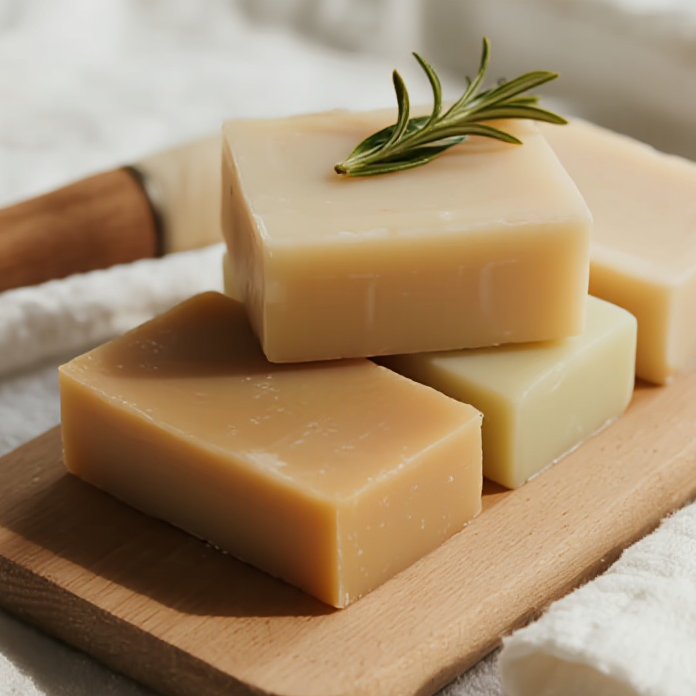Introduction
Dry skin can be uncomfortable, irritating, and sometimes even painful. Whether caused by environmental factors, aging, or harsh skincare products, dry skin requires special care and attention. When it comes to choosing soap for dry skin, many people struggle to find the right product that doesn’t strip away natural moisture or exacerbate the issue.
The wrong soap can make your dry skin worse, leaving it feeling tight, flaky, and irritated. On the other hand, choosing the right soap can help replenish lost moisture, soothe irritation, and leave your skin feeling soft and hydrated.
In this article, we’ll walk you through everything you need to know about choosing the best soaps for dry skin, from key ingredients to avoid to recommendations for nourishing, moisturizing options.
1. Why Choosing the Right Soap Matters for Dry Skin
Dry skin occurs when the skin’s natural moisture barrier is compromised. This can happen for a variety of reasons, including:
-
Environmental factors: Cold weather, low humidity, and hot showers can strip moisture from your skin.
-
Harsh skincare products: Soaps or body washes that contain harsh chemicals or fragrances can further dehydrate the skin.
-
Skin conditions: Eczema, psoriasis, and other skin conditions can lead to increased dryness.
When you use soap that’s too harsh, it can strip your skin of its natural oils, leaving it even more dry and irritated. That’s why choosing a gentle, hydrating soap is essential for managing dry skin.
2. Key Ingredients to Look for in Soaps for Dry Skin
The key to selecting the right soap for dry skin lies in choosing ingredients that will hydrate, soothe, and protect the skin’s natural barrier. Here are some of the best ingredients to look for:
1. Glycerin
Glycerin is a powerful humectant that draws moisture from the environment into the skin. It helps keep your skin hydrated by pulling water into the skin’s surface. Soaps with glycerin help retain moisture, preventing your skin from becoming dry and cracked.
2. Shea Butter
Shea butter is packed with vitamins and fatty acids that nourish and moisturize the skin. It’s a popular ingredient in soaps for dry skin due to its ability to deeply hydrate and soothe even the driest skin.
3. Olive Oil
Olive oil is known for its moisturizing properties, and it’s packed with antioxidants that help repair and protect the skin. Olive oil-based soaps can provide lasting hydration while maintaining the skin’s natural moisture balance.
4. Coconut Oil
Coconut oil has been used for centuries to soothe and hydrate dry skin. It has natural anti-inflammatory and antimicrobial properties, making it ideal for reducing dryness while protecting against skin irritation.
5. Honey
Honey is a natural humectant, meaning it helps retain moisture. It’s also packed with vitamins, minerals, and antioxidants that help nourish and heal dry skin. Honey-infused soaps can gently cleanse while offering a boost of hydration.
6. Aloe Vera
Aloe vera is a soothing, cooling ingredient that helps to hydrate dry, irritated skin. It’s known for its anti-inflammatory and healing properties, making it a great addition to soaps for sensitive and dry skin.
7. Jojoba Oil
Jojoba oil closely resembles the natural oils produced by the skin. It helps balance moisture levels and provides a protective barrier that prevents the skin from becoming dry. It’s a great option for moisturizing and soothing dry skin.
3. Ingredients to Avoid for Dry Skin
While certain ingredients can benefit dry skin, others can exacerbate the problem. Here are some ingredients you should avoid when selecting soap for dry skin:
1. Sodium Lauryl Sulfate (SLS)
Sodium lauryl sulfate is a common surfactant found in many soaps and cleansers. While it effectively removes dirt and oil, it can also strip the skin of its natural moisture, leaving it feeling dry, tight, and irritated. Look for SLS-free soaps for a gentler, more hydrating option.
2. Alcohol
Alcohol-based ingredients, such as ethanol and isopropyl alcohol, can dry out the skin by removing moisture. These should be avoided in soaps, as they can leave your skin feeling parched and dehydrated.
3. Fragrances and Dyes
Artificial fragrances and dyes in soap can irritate sensitive or dry skin. They often contain harsh chemicals that can worsen dryness and cause allergic reactions. Opt for fragrance-free or naturally scented soaps to minimize irritation.
4. Triclosan
Triclosan is an antibacterial agent often found in soaps and body washes. It can disrupt the skin’s natural barrier, leading to dryness and sensitivity. It’s best to avoid soaps with triclosan if you have dry or sensitive skin.
5. Parabens
Parabens are preservatives used in many skincare products, but they can cause irritation and dryness. Look for soaps labeled paraben-free to ensure a gentler product.
4. Types of Soaps for Dry Skin
1. Bar Soap
Bar soaps have evolved from their harsh, drying reputation. Today, many bar soaps are formulated with nourishing oils, glycerin, and soothing ingredients. When choosing a bar soap for dry skin, look for products with moisturizing oils, like olive oil or shea butter, and avoid those with harsh detergents or artificial fragrances.
Best Bar Soap Ingredients for Dry Skin:
-
Shea butter
-
Olive oil
-
Coconut oil
-
Jojoba oil
-
Honey
2. Liquid Soap
Liquid soaps tend to be more hydrating than bar soaps and are easier to apply to your skin. Look for gentle, creamy liquid soaps that contain moisturizing ingredients like glycerin or aloe vera. Liquid soaps are often used in showers and bathrooms, and many of them offer specialized formulas for dry or sensitive skin.
Best Liquid Soap Ingredients for Dry Skin:
-
Glycerin
-
Aloe vera
-
Vitamin E
-
Jojoba oil
-
Coconut oil
3. Cream or Oil-based Soap
Cream or oil-based soaps are highly moisturizing and are perfect for people with extremely dry skin. These soaps are rich in hydrating ingredients that leave a layer of moisture on your skin. They are especially beneficial for areas like elbows, knees, and feet, which tend to be drier than other parts of the body.
Best Cream or Oil-based Soap Ingredients for Dry Skin:
-
Shea butter
-
Cocoa butter
-
Olive oil
-
Almond oil
-
Rosehip oil
5. How to Use Soap for Dry Skin Properly
The way you use soap can also make a big difference in how it affects your skin. Here are some tips for properly using soap for dry skin:
-
Avoid hot water: Hot water strips natural oils from the skin, exacerbating dryness. Use lukewarm water instead to help lock in moisture.
-
Don’t over-cleanse: Over-cleansing can worsen dryness. Stick to gentle cleansing once or twice a day.
-
Moisturize immediately: After using soap, apply a rich moisturizer while your skin is still damp to lock in hydration.
-
Use a mild soap: Avoid overly harsh soaps that can cause dryness. Stick to products labeled for dry or sensitive skin.
6. Top Recommendations for Soaps for Dry Skin
Here are some highly recommended soaps that are formulated specifically for dry skin:
-
Dr. Bronner’s Pure-Castile Soap: Known for its organic ingredients, this soap is gentle, hydrating, and available in various scents (unscented for sensitive skin).
-
Olay Ultra Moisture Bar Soap: Contains sheer butter to nourish and hydrate dry skin.
-
CeraVe Hydrating Cleanser Bar: A non-foaming bar that’s packed with glycerin and ceramides, providing moisture and restoring the skin’s natural barrier.
-
L’Occitane Shea Butter Extra Gentle Soap: Rich in shea butter, this soap is great for ultra-dry skin.
-
Aveeno Moisturizing Bar: Contains oatmeal and glycerin, perfect for soothing dry, itchy skin.
Conclusion
Choosing the right soap for dry skin can transform how your skin feels and looks. By opting for moisturizing, gentle, and hydrating formulas, you can help restore your skin’s moisture balance, improve its texture, and keep it looking soft and healthy.
Remember, gentle cleansing is the key to preventing further dryness, and incorporating a nourishing moisturizer right after will help lock in hydration. Whether you prefer bar soap, liquid soap, or oil-based cleansers, there’s a product out there to fit your specific needs.
Say goodbye to tight, flaky, and irritated skin—choose a soap that works for you and enjoy soft, smooth, and hydrated skin every day!

